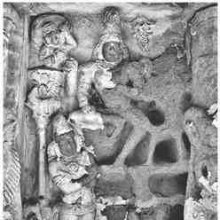Rati, Ratī, Rāti, Rāṭi: 53 definitions
Introduction:
Rati means something in Buddhism, Pali, Hinduism, Sanskrit, Jainism, Prakrit, the history of ancient India, Marathi, Hindi, biology, Tamil. If you want to know the exact meaning, history, etymology or English translation of this term then check out the descriptions on this page. Add your comment or reference to a book if you want to contribute to this summary article.
Rati has 52 English definitions available.
Images (photo gallery)
(+1 more images available)
Languages of India and abroad
Sanskrit dictionary
[Deutsch Wörterbuch]
Source: Cologne Digital Sanskrit Dictionaries: Böhtlingk and Roth Grosses Petersburger WörterbuchRati (रति):—(von ram) f.
1) Rast, Ruhe: i.a ratiri.a ramadhvam [Vājasaneyisaṃhitā 8, 51.] [Śāṅkhāyana’s Gṛhyasūtrāṇi 4, 9.] —
2) Lust, Behagen, Gefallen an (loc.); = rāga [Hemacandra’s Anekārthasaṃgraha 2, 190.] [Medinīkoṣa t. 49.] ratirmano nukūle rthe manasaḥ pravaṇāyitam [Sāhityadarpana 207. 206.] [Hemacandra’s Abhidhānacintāmaṇi 72. 295.] [Halāyudha 1, 91.] [Kaṭhopaniṣad 1, 28.] [MAITRYUP. 3, 5. 5, 1.] [Manu’s Gesetzbuch 1, 25.] uttamā [9, 28.] eṣa strīpuṃsayorukto dharmo vo ratisaṃhitaḥ [103.] [Mahābhārata 14, 389.] [Harivaṃśa 6733] (wo die neuere Ausg. teṣāṃ rativināśanam liest). [Rāmāyaṇa 2, 49, 15 (46, 17 Gorresio). 94, 26. 95, 5.] [Rāmāyaṇa Gorresio 1, 9, 29. 2, 28, 27. fg. 4, 44, 105.] karau vyādhunvatyāḥ pibasi ratisarvasvamadharam [Śākuntala 22. 34.] [Spr. 4469. 4854.] mūrtimatyau ratinirvṛtī iva [Kathāsaritsāgara 16, 123.] [Bhāgavatapurāṇa 1, 8, 42.] tatra vāse [Mahābhārata 1, 6130.] rājye [9, 1792.] [Vikramorvaśī 105.] [Spr. 688. 755.] subhṛtyeṣu [859. 1322. 2279.] svayoṣiti [2773. 4275.] śrīśe bhaktiratī [5094.] [Varāhamihira’s Bṛhajjātaka S. 69, 25.] [Kathāsaritsāgara 2, 9.] [Bhāgavatapurāṇa 1, 2, 8. 5, 26. 9, 35. 2, 2, 34. 4, 22, 25. fg.] [Mārkāṇḍeyapurāṇa 70, 19.] [VṚDDHA-Cāṇakya 6, 14.] tyaktadharmarati adj. [Rāmāyaṇa 2, 75, 37.] bhava [Spr. 571.] [Bhāgavatapurāṇa 1, 9, 36. 3, 5, 11. 8, 10. 28, 3.] tāmupāśraya ratiṃ candrārdhacūḍāmaṇau [Spr. 2256.] ratimāpsyanti te tvayi (so die neuere Ausg.) [Harivaṃśa 3173.] sveṣu dāreṣu ratiṃ nopalabhe [Rāmāyaṇa 5, 22, 30.] na ratiṃ lebhe [Kathāsaritsāgara 33, 65. 38, 92.] ratiṃ svakeṣu dāreṣu nādhigacchāmi [Rāmāyaṇa 3, 53, 33.] ratiṃ na vindate rāmastvāmapaśyan [5, 32, 38.] [Harivaṃśa 9217.] na śayyāsanabhogeṣu ratiṃ vindati karhicit [Mahābhārata 3, 2107.] [Mārkāṇḍeyapurāṇa 20, 21.] pāpe ratiṃ mā kṛthāḥ finde keinen Gefallen an [Spr. 1051. 1995. 3085.] ko na kuryātkathāratim [Bhāgavatapurāṇa 1, 2, 15.] ratiṃ badhnāti yatra ca [Spr. 4825, v. l.] yathā nṛpatisaukhyeṣu babandha na ratiṃ kvacit [Kathāsaritsāgara 3, 29. 57, 103.] [Mārkāṇḍeyapurāṇa 62, 9.] ātma adj. seine Lust habend —, Gefallen findend an [Chāndogyopaniṣad 7, 25, 2.] [Muṇḍakopaniṣad 3, 1, 4.] [Bhagavadgītā 3, 17.] adhyātma adj. [Manu’s Gesetzbuch 6, 49.] bhāryā adj. [Yājñavalkya’s Gesetzbuch 1, 121.] dharma adj. [Raghuvaṃśa 1, 23.] samānayoni adj. [Spr. 631.] vanaśailagokula adj. [Varāhamihira’s Bṛhajjātaka 18, 2.] kalaha adj. [Sāhityadarpana 79.] svātmanrati adj. [Bhāgavatapurāṇa 3, 4, 16.] —
3) insbes. Wollust, Liebeslust, Liebesgenuss, coitus [Hemacandra’s Abhidhānacintāmaṇi 537.] [Hemacandra’s Anekārthasaṃgraha] [Medinīkoṣa] [Halāyudha 2, 414. 5, 42.] ye divā ratyā saṃyujyante [Praśnopaniṣad 1, 13.] ānandaṃ ratiṃ prajātim [Kauṣītakyupaniṣad 1, 7.] [Manu’s Gesetzbuch 3, 45. 11, 5.] [Mahābhārata 13, 2229.] [Rāmāyaṇa 5, 14, 26.] [DAŚAR. 1, 30.] [Vikramorvaśī 85.] paṇyastrī [Meghadūta 26.] [Spr. 20.] śakti [2077. 2959. 3459. 4862.] [Śiśupālavadha 4, 66.] [Varāhamihira’s Bṛhajjātaka S. 74, 18.] bhoga [104, 29.] [Rājataraṅgiṇī 3, 508. 5, 383.] [Bhāgavatapurāṇa 4, 6, 25. 5, 11, 10. 7, 12, 26. 9, 14, 19.] taddīyatāṃ me ratidakṣiṇā [Pañcatantra 226, 1.] yā na vetti sadā puṃsāṃ caturāṇāṃ ratikramam [Vetālapañcaviṃśati] in [Lassen’s Anthologie (III) 16, 20.] lampaṭa [Weber’s Verzeichniss No. 1006.] jña [Spr. 853.] —
4) die Schamtheile [Medinīkoṣa] —
5) elliptisch für ratigṛha Lusthaus [Varāhamihira’s Bṛhajjātaka S. 53, 9.] —
6) die personif. Liebeslust als Gemahlin Kāma’s [Hemacandra’s Abhidhānacintāmaṇi 229.] [Hemacandra’s Anekārthasaṃgraha] [Medinīkoṣa] [Halāyudha.1,34.] [Oxforder Handschriften 190,b,35.] [Mahābhārata.1,2597.] [Harivaṃśa 4600. 9533. 12482.] [Rāmāyaṇa.3,52,27.] [Kumārasaṃbhava.2,64.] [Raghuvaṃśa.6,2.7,15.] [Kathāsaritsāgara 16,75. 18,27. 21,32. 22,3. 104.] [Prabodhacandrodaja.6,3.] [PAÑCAR.1,10,92.] [WEBER, Rāmatāpanīya Upaniṣad 303.] [Oxforder Handschriften 21,b,2. 101,b,7.] ratī [Mahābhārata 3, 2665.] [Harivaṃśa 10064] (die neuere Ausg. rateḥ suta). [Rāmāyaṇa 3, 4, 9. 5, 18, 26.] [Mārkāṇḍeyapurāṇa 21, 16.] —
7) Bez. der 6ten Kalā des Mondes [Oxforder Handschriften 18,b,25.] —
8) Nomen proprium einer Apsaras [Mahābhārata 13, 1425.] —
9) Nomen proprium der Gattin Vibhu's und Mutter Pṛthuṣeṇa’s [Bhāgavatapurāṇa 5, 15, 5.] —
10) Bez. eines best. über Waffen gesprochenen Zauberspruches [Rāmāyaṇa 1, 30, 7 (31, 8 Gorresio).] —
11) mystische Bez. des Buchstabens na [WEBER, Rāmatāpanīya Upaniṣad 318. 320.] —
12) ein best. Metrum, 4 Mal ¯ ˘ [Colebrooke II, 158 (II, 2).] — Vgl. 3. a (Trauer auch [Mahābhārata 15, 897]), nirmāṇa, bhū, līlā.
--- OR ---
Rāṭi (राटि):—(von raṭ) f. Schlacht, Kampf [Hemacandra’s Abhidhānacintāmaṇi 798.] m. = śarāri [Śabdakalpadruma] nach [Amarakoṣa 2, 5, 25]; hier ist aber āṭi gemeint.
--- OR ---
Rāti (राति):—
--- OR ---
Rāti (राति):—vgl. auch śrotu .
Source: Cologne Digital Sanskrit Dictionaries: Sanskrit-Wörterbuch in kürzerer FassungRati (रति):—f. —
1) Rast , Ruhe. —
2) Lust , Behagen , Gefallen , — an (Loc. oder im Comp. vorangehend). ratim āp , labh , upa-labh , adhi-gam , vid , kar (zu [Indische sprüche 3613]) und bandh Gefallen finden. —
3) Wollust , Liebeslust , Liebesgenuss , coitus. Personificirt als eine der Gattinnen des Liebesgottes [134,21.] —
4) die Schamtheile. —
5) elliptisch für ratigṛha Lusthaus. —
6) die sechste Kalā des Mondes. —
7) ein best. über Waffen gesprochener Zauberspruch. —
8) ein best. Metrum. —
9) mystische Bez. des Lautes na. —
10) Nomen proprium einer Apsaras. — b) der Gattin Vibhu’s und Mutter Pṛthuṣeṇa's.
--- OR ---
Rāṭi (राटि):—f. Schlacht , Kampf.
--- OR ---
Rāti (राति):——
1) Adj. bereitwillig , günstig ; zu geben willig. —
2) f. — a) Verleihung , Gunst , Gnadenbezeugung ; Gabe , Opfergabe. — b) indrasya rātī (v.l. rātiḥ) Namen von Sāman [Ārṣeyabrāhmaṇa]
Sanskrit, also spelled संस्कृतम् (saṃskṛtam), is an ancient language of India commonly seen as the grandmother of the Indo-European language family (even English!). Closely allied with Prakrit and Pali, Sanskrit is more exhaustive in both grammar and terms and has the most extensive collection of literature in the world, greatly surpassing its sister-languages Greek and Latin.
See also (Relevant definitions)
Starts with (+147): Rati badami, Rati bhonyasan, Rati biyani, Rati gulabi, Rati kali, Rati safed, Rati-chanoti, Rati-fudardi, Rati-pani, Ratib, Ratiba, Ratibaddha, Ratibandha, Ratibandhu, Ratibhadra, Ratibhanga, Ratibhara, Ratibhavana, Ratibhoga, Ratibu.
Ends with (+657): Abbhokirati, Abbhudaharati, Abbhuggirati, Abbhukkirati, Abharati, Abhiharati, Abhikirati, Abhinavabharati, Abhinavanrisimhabharati, Abhinavasaccidanandabharati, Abhiniharati, Abhinirharati, Abhippakirati, Abhiprakirati, Abhiprasarati, Abhipurati, Abhirati, Abhittharati, Abhivitarati, Abhrati.
Full-text (+632): Arati, Radi, Ratipati, Ratiramana, Kamapatni, Ratipriya, Hijo-rati, Rathin, Ratikuhara, Rativara, Ratigriha, Ratimandira, Ratikriya, Ratyanga, Aratika, Alarshirati, Ratikara, Ratirahasya, Adhyatmarati, Smarapriya.
Relevant text
Search found 129 books and stories containing Rati, Ratī, Rāti, Rāṭi, Rātī, Rathi, Radi, Radhi, Raati; (plurals include: Ratis, Ratīs, Rātis, Rāṭis, Rātīs, Rathis, Radis, Radhis, Raatis). You can also click to the full overview containing English textual excerpts. Below are direct links for the most relevant articles:
Rig Veda (translation and commentary) (by H. H. Wilson)
Bhakti-rasamrta-sindhu (by Śrīla Rūpa Gosvāmī)
Verse 3.4.53 < [Part 4 - Parenthood (vātsalya-rasa)]
Verse 2.5.98 < [Part 5 - Permanent Ecstatic Mood (sthāyī-bhāva)]
Verse 2.5.42 < [Part 5 - Permanent Ecstatic Mood (sthāyī-bhāva)]
Garga Samhita (English) (by Danavir Goswami)
Verse 1.13.4 < [Chapter 13 - The Liberation of Pūtanā]
Verse 2.9.28 < [Chapter 9 - Brahmā’s Prayers]
Verse 4.8.28 < [Chapter 8 - In the Story of the Yajña-sītās, the Glories of Ekādaśī]
Chapter 6 - Bhishma Assesses the Heroes and Reveals Shikhandi's Mysterious Birth < [Udyoga Parva]
Chapter 1 - The Eleventh Day of Rivalry; Dronacharya Becomes Commander < [Drona Parva]
Sahitya-kaumudi by Baladeva Vidyabhushana (by Gaurapada Dāsa)
Text 9.9 < [Chapter 9 - Ornaments of Sound]
Text 4.49 < [Chapter 4 - First-rate Poetry]
Text 4.28 < [Chapter 4 - First-rate Poetry]
Hari-bhakti-kalpa-latikā (by Sarasvati Thkura)
Text 35 < [First Stabaka]
Related products






